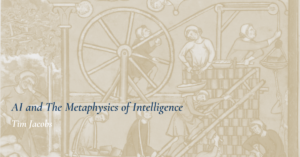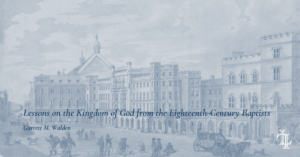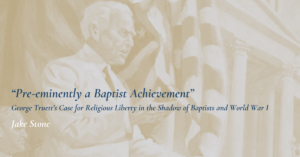Modern technology has proven a boon to the proliferation of ‘celebrity’ preachers. The expansion of social media has made online pulpits accessible across the globe at a moment’s notice. A gifted expositor in southern California can gain an audience in Brazil as readily as he can in central Mississippi. To be sure, this development has enabled untold numbers of believers to be routinely edified by a steady diet of biblical exposition and Christian cultural commentary available at the touch of a device. Such platforms have even helped perpetuate a host of annual and biannual conferences where the virtual throngs prove their zeal, inhabiting the same physical spaces as their ‘spiritual heroes.’ At their best, these gatherings enable like-minded Christians from across the globe to commune with one another and experience the faintest glimmer of that future Jerusalem, our eternal home, filled with the honeyed tones of blood-bought saints from every tongue, tribe, and nation worshipping their Creator forever. Insofar as the platforms of notable Christians help encourage and facilitate this Christ-exalting fellowship and the edification of the church militant, we ought to give thanks to God.
We would do well, however, to keep our eyes trained on the local church—God’s divinely appointed means for the promulgation and growth of believers, wherein he has given as gifts to the local body, godly men gifted in teaching scripture and shepherding souls to heaven. As Paul exhorts the church of the Thessalonians, “[w]e ask you brothers, to respect those who labor among you and are over you in the Lord and admonish you, and to esteem them very highly in love because of their work”.[1] Whatever the abilities of certain prominent preachers, God has specially appointed and charged local elders with the responsibility of tending His flock, a duty that is by no means less than the consistent, faithful preaching of His word. Therefore, in imbibing the wonderful truths taught through ministries in far-flung corners of the globe, we must always reserve the preeminent place in our hearts and minds to our own pastors.
As a help to do just that, we have the wisdom of history as a competent guide. For despite the extent to which technology has widened the horizons of the ‘Christian-famous’ platform, the phenomenon of the ‘celebrity’ pastor is hardly an animal of modernity. Indeed, the nearly 400-year-old diary of London woodturner Nehemiah Wallington (1598-1658) is a testament to the allure of powerful preaching ministries outside of the local body of believers. Wallington’s notebooks offer a fascinatingly rare glimpse at the devotional life of an ‘ordinary’ constituent of the puritan laity, recording as it does his spiritual peaks and troughs from 1618 to 1654. His entries in September of 1642, examined below, offer an incisive look at the way one Christian wrestled with, and ultimately resolved, the tendency in his own heart to subvert the authority of the local pastor with an undue allegiance to the preaching of a platformed minister of the word.
Given his context, Wallington serves as an unusually good case study on this point. As Patrick Collinson’s work has made clear, in the early years of the post-Reformation, under the Elizabethan regime, there was an “uneven and inadequate provision of preaching” in English parishes, which caused iterant preaching ministries to pop up in some regions, and promoted the development of puritan patronage schemes intended to keep godly preachers available for a word-starved laity.[2] It was in this milieu, Collinson observes, that ‘sermon-gadding’—the practice among the godly of “accompanying their favoured preachers from place to place”—became popular.[3] This practice served as a particularly acute sign of “godly zeal” and gave many in the late Elizabethan and early-Stuart establishment wobbly knees, suggesting as it did that the puritan-affined were growing “addicted to sermons” and quite ready to cast off the ecclesiological fetters of the English national church.[4] Begun as a mode of providing godly preaching in the face of the firm hesitance of the Elizabethan and Stuart authorities to accede to puritan efforts to institute a more thoroughly reformed national church after the mold of their continental co-religionists in Switzerland, France, and the Netherlands, sermon-gadding became popular even for those who had access to competent exposition. This was especially the case in London, which became a hotbed of puritan preaching in Nehemiah Wallington’s day, right at the start of the English Civil Wars and the temporary ascendancy of the puritan political program, embodied in part by the Westminster Assembly.[5] Wallington notes that he had access to the preaching of such puritan luminaries as Jeremiah Burroughs, Simeon Ashe, and John Owen’s predecessor in London, Joseph Caryl.[6]
Yet, Wallington’s trips to listen to 17th century ‘celebrity’ preachers were most certainly not the product of any glaring preaching deficit in his own parish of Eastcheap. Indeed, his main teaching pastor for most of his adult life was Henry Robrough, an engaged, non-voting participant in the Westminster Assembly, who served in that capacity from 1643-1649.[7] As such, Robrough was privy to the theological debates and resolutions intended to restructure the Church of England. Of particular significance was his involvement in the construction of the Directory of Public Worship. He served as one of the scribes during its drafting. Not to mention, Robrough had a hand in helping put to press the Westminster Confession of Faith. His activities among the Westminster divines not only indicate his theological inclinations (evident at length in his extant sermons and publications),[8] but they situate him within the puritan doctrinal mainstream.[9] Wallington, then, sat under both the preaching and counsel of a divine who was keyed-in to the central theological debates of the day.
Still though, like many in the godly circles in which he ran, he availed himself of the opportunities London offered to sit in on the inspired preaching of some of the most well-known Puritans of the seventeenth century. Wallington gave thanks to God for his “exceeding great mercy and free love…in giving” him “such abundance and variety of his word” through the mouths of so many different preachers.[10] Indeed, in April of 1654 alone, he “heard near unto thirty sermons.”[11] While recognizing the grace God had afforded him with the surfeit of sermons and preachers from which he could choose, Wallington was sober-minded enough to remain circumspect towards his attempts to draw such spiritual benefit outside of the context of his local church. Importantly, in 1642, he was especially given to reflection on this point after a sermon by the independent divine, Joseph Caryl. Wallington’s notebook recapitulates the sermon, which dealt with lay responsibility in deriving benefit from the preaching of the Word, applying it to his own life in Eastcheap.[12] Caryl’s words pressed Wallington to consider “[w]hy I might not as well benifet by hereing of Master Robroh as by hearing of some others hee being a Minister of God and teaching the truth as well as others [?] Is the fault in the Minister or in the hearer[?]”[13] As might be expected, Wallington looked internally for the source of the problem, concluding, “it must be in the hearer.”[14] His diary then records some general reasons he compiled for not profiting as much from his own pastor’s preaching as he did from those more notable divines he so eagerly traveled to hear:
1. Antipathy or “ill will” towards the minister.
2. An outsized preference for more graceful and pithy prose.
3. Undue “admiration” for the gifts of certain men.
4. Discouragement in the natural abilities of a particular pastor.
5. God’s judgment in the hearer for their hardened heart.
6. An itching ear that cannot discern or understand “wholesome doctrine.”
7. An insufficient respect for the role of the local minister.
8. A failure to “earnestly and heartily” pray for his own pastor.
9. A lack of thanks to God for the gift of a faithful preacher.
10. Neglecting to bring a “hungry and humble heart” to the preaching of the word.[15]
The Lord seemed to prick Wallington’s heart in a significant way through Caryl’s sermon, and it inspired a real adjustment in his attitude toward Robrough’s regular preaching in Eastcheap. The very next Sunday, Wallington heard his pastor with refreshed ears and profited greatly. His notes from that day include a summary of the sermon and his recognition that the “Lord first did move my heart to have a reverent respect to his faithful messenger and then he gives a blessing to the means (therefore despise not small things).”[16] Even several months on, in March of 1643, he took note of the fact that after hearing the Presbyterian minister Simeon Ashe preach on one occasion, “although that Master Ash is esteemed of some the more excellent yet praised be my God I did profit most by Master Robrough.”[17] In July of that same year, in an entry characteristic of much of what he would write thereafter about Robrough’s preaching, Wallington recorded his thoughts on a particularly compelling sermon given in Eastcheap, marveling at “how did my God stir me up to give a listening ear to his message sent by his servant Master Robrough and oh how sweet was it to my soul.”[18] After honestly examining his heart on the issue of ‘sermon-gadding’, Wallington resolved himself to “going better prepared with better affections…in hearing of Master Robrough” on the Lord’s Day.[19]
This diligent self-examination bore fruit even when, in 1650, Eastcheap received the services of a new Independent minister, Matthew Barker, after Henry Robrough’s death. Wallington sought to encourage his new pastor, writing to him that “I do praise the Lord for you so I give you kind thanks for your pains both in prayer and preaching which I am much taken with, for they are very sweet and profitable to me.”[20] This, even in a letter in which Wallington writes with concerns about Barker’s tendency in his sermons to “make the way to heaven easier than it is” by neglecting to remember that “God’s people have great need to be told of their sins.”[21] Despite his genuine misgivings about Barker’s preaching at times, Wallington made a point to patiently encourage his new pastor, and articulated his “troubles” “in love and reverence.”[22] Or, as he put it in the first line of the letter, “Sir I love you from my heart, but yet I quarrel with you in my mind.”[23] Wallington was committed enough to his local church to “speak plainly” with his pastor in the hope of making Barker’s ministry to a congregation—of which Wallington had been a member for over thirty years—more spiritually profitable.[24] Rather than simply packing it in and seeking his preaching druthers elsewhere, Wallington self-consciously exercised patience and love to help advise this new pastor as he began a local church ministry that would last until his ejection under the Act of Uniformity in 1662. In truly poetic irony, Wallington’s sermon-gadding sortie in 1642 had aroused in him lasting commitments to (1) respect the godly authority of his own pastor and (2) to build him up for the sake of the health of the local church body.
Though Wallington continued to enjoy hearing from notable preachers and benefitted greatly from the many sermons he was privileged to attend, he rightly questioned the propriety of seeking his chief spiritual nourishment outside of his local church. Thankfully, the Lord worked mightily in his heart to convict him of his sin in this regard and sanctify him into an even more edifying member of his local congregation. He was eventually recognized as an elder in his classis at the (albeit brief and geographically limited) introduction of presbyterian governance in the English national church. [25] This episode from the spiritual life of a lay craftsmen in seventeenth-century London offers us an excellent example of how we might toe the rather thin line between the blessing that modern technology can be as a conduit for biblical truth, and the ungodly hero worship that we can so often fall into through an enthrallment with gifted ‘celebrity’ preaching. Wallington’s story serves as a marvelous picture of the power of biblical self-examination to engender spiritual growth for both personal and corporate edification. Given the proclivity of fallen human beings to seek their own Boswells[26], we should be wary of helping facilitate the creation of ‘celebrity’ platforms through our own neglect to rightly respect the shepherds God has, in His good providence, seen to ordain among our local gatherings. By all means, let us rejoice that He has provided a multitude of preaching ministries for the proclamation of His word. But let us heed the example of Nehemiah Wallington and work to avoid supplanting the divinely appointed role of the local pastor in Christian life.
[1] 1 Thessalonians 5:12-13 (ESV).
[2] Patrick Collinson, The Religion of Protestants: The Church in English Society 1559-1625, (Oxford: Clarendon Press, 1982), 257.
[3] Ibid.
[4] Arnold Hunt, The Art of Hearing: English Preachers and their Audiences, 1590-1640, (Cambridge: Cambridge University Press, 2010), 190.
[5] See e.g., Patrick Collinson, The Elizabethan Puritan Movement, (Berkeley: University of California Press, 1967), 87.
[6] The Notebooks of Nehemiah Wallington, 1618-1654: A Selection, ed. David Booy (Aldershot: Ashgate Publishing Limited, 2007), 169, 171.
[7] See The Minutes and Papers of the Westminster Assembly, 1643-1652, ed. Chad Van Dixhoorn (Oxford: Oxford University Press, 2012), 134.
[8] See e.g., Henry Robrough, Balme From Gilead, to Cure All Diseases, Especially the Plague: Foure and Twentie Sermons on 2 Chron. 7.23,14. And Two Sermons of Thankesgiuing for Gods Deliuerance of London from the Plague. Preached Anno 1625 (London: Iohn Norton and Augustine Mathewes, 1626); Henry Robrough, The Doctrine of Justification Cleared (London: R.C., 1643).
[9] See generally The Doctrine of Justification Cleared. Robrough offered an attack on John Goodwin’s writings on justification, demonstrating his bona fides among the Westminster divines.
[10] The Notebooks of Nehemiah Wallington, 299.
[11] Ibid.
[12] Ibid., 171.
[13] Ibid.
[14] Ibid.
[15] Ibid.
[16] Ibid., 172.
[17] Ibid., 187.
[18] Ibid., 200.
[19] Ibid., 172.
[20] Ibid., 260.
[21] Ibid., 261.
[22] Ibid., 260.
[23] Ibid.
[24] Ibid., 261.
[25] Ibid., 4.
[26] Life of Samuel Johnson (1791).
Author
-

Jonathan Baddley is a PhD student at Cambridge University, serves as the Reformation theology editor for the London Lyceum, and as Senior Editor for Confessional and Historical Theology at Hanover Press. While focused broadly on the progress of the Protestant Reformation in 16th and 17th century Europe, he is especially interested in ecclesiology and church discipline in post-Reformation England. He is writing a dissertation on preparation for the Lord’s Supper in the long 17th century. He has a forthcoming essay in Church History entitled ‘Puritanism, Spiritual Kinship, and the Lord’s Supper in Elizabethan and Early Stuart England.’
View all postsRecent Posts



